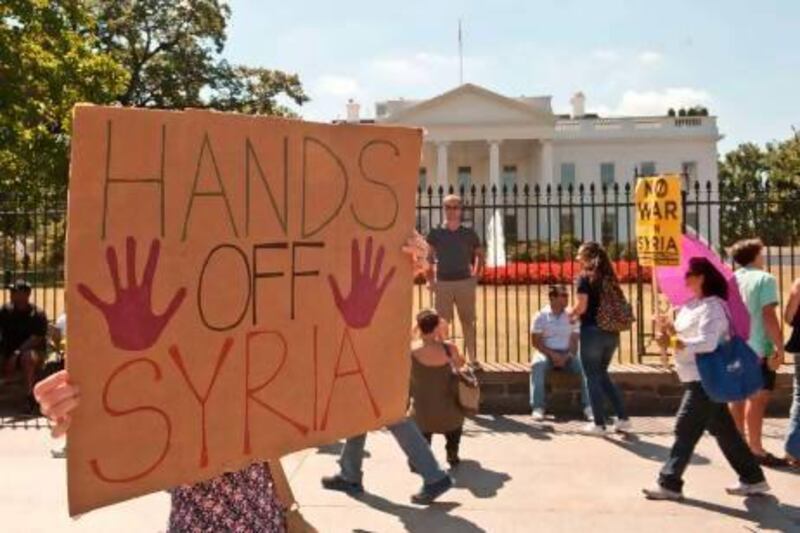NEW YORK // Barack Obama and John Kerry were engaged in a frantic last-minute push yesterday to rally support at home and abroad for a missile strike on Syria.
As the US president prepared for a congressional vote on military action against the Assad regime, the secretary of state met European Union ministers to call for backing.
The US says it has evidence that Bashar Al Assad's forces used sarin gas in an attack last month on eastern suburbs of Damascus in which 1,429 people died, including 426 children.
After yesterday's meeting the EU ministers ended days of division on the issue and said intelligence "seems to indicate strong evidence that the Syrian regime is responsible for these attacks", but they said military action should wait for a UN inspectors' report on the chemical attack. In Paris to meet Arab League ministers, Mr Kerry said last night at least 10 countries were ready to join miltary action.
Mr Obama received support yesterday from the Gulf Cooperation Council, which urged the international community to intervene immediately to "rescue" the Syrian people from their government's "oppression".
"The genocide, and grave human rights violations, faced by the Syrian people necessitate an immediate intervention by the international community," the GCC secretary general Abdullatif Al Zayani said.
Back in Washington after attending a G20 summit in Russia at which he tried to rally international support, Mr Obama appealed to Congress not to "turn a blind eye" to Syria.
"I call on members of Congress, from both parties, to come together and stand up for the kind of world we want to live in; the kind of world we want to leave our children and future generations," Mr Obama said in his weekly address.
A week after his surprise decision to delay military intervention and seek approval from Congress, the White House is scrambling to build up support in the Democrat-controlled Senate as well as the House of Representatives.
According to a count by ABC News on Thursday, 217 of the 433 members of the lower chamber will probably oppose any resolution on the issue.
"I continue to have many, many questions about the ramifications of a limited military strike … I am also very wary of the United States becoming entangled more and more deeply in what is a civil war," said the Republican senator Susan Collins.
A vote had been expected on a revised war resolution in the 100-member Senate as soon as tomorrow, when Congress returns from recess.
Mr Obama received a major boost on Wednesday, when senior members from both parties, including his nemesis in the House, the Republican speaker John Boehner, called on junior colleagues to support intervention on the grounds that the issue transcended Washington politics and was a matter of American credibility globally.
But liberal Democrats and right-wing Republicans who both oppose US military involvement in another Middle East war have refused to support the revised plan, which now authorises "limited military action" without the use of regular ground forces for 60 days with one 30-day extension allowed.
Others - some of whom voted for the invasion of Iraq a decade ago - are making their vote conditional on the administration's promise to keep any strikes tightly limited. A small but influential group of hawks are pulling Mr Obama in the opposite direction, and say they will support only a plan that does more than punish Damascus, and changes the momentum of the war in favour of the Syrian opposition.
Mr Obama will make his case for military action directly to Americans on Tuesday. He cancelled a trip to California to personally lobby for support in Washington tomorrow as the Senate debate begins.
Mr Obama's effort will receive a great boost from the powerful pro-Israel lobby group, the American-Israel Public Affairs Committee, which is reported to be preparing an all-out effort in support of the resolution.
"We plan a major lobbying effort with about 250 activists in Washington to meet with their senators and representatives," an Aipac source said yesterday.
The Israeli government worries that Iran will be emboldened to redouble its nuclear ambitions if Washington does not punish Syria.
Mr Obama's decision to consult Congress on military action that other presidents have routinely taken independently under the War Powers Act has been described by critics as the latest half-measure by an indecisive American leader who has dangerously weakened the country's credibility abroad.
But others say this ignores the domestic political imperatives for a president who was elected on promises to end America's wars in the Middle East, and who as a candidate called for congressional authorisation for interventions such as the one under discussion now.
"We have our own process here and this is very controversial, and so our institutions demand that we have consultation," said Steven A Cook, a senior Middle East expert at the Council on Foreign Relations think tank in New York. "And that's something people in the Middle East should respect."
Congressional authorisation could also enable Mr Obama to pursue more than just limited punitive strikes, analysts said.
The White House could develop a more coherent Syrian strategy that includes intensified diplomacy with Damascus's main supporters Russia and Iran, as well as efforts to strengthen rebel forces.
"It gives him a much freer hand because he will have received permission from Congress, including from most Republicans … and it will give him cover to do things people don't expect " said Hussein Ibish, a Middle East expert at the American Task Force on Palestine.





